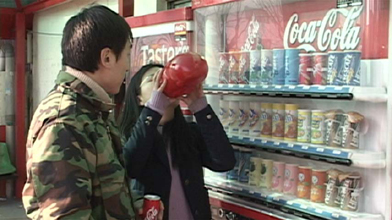Jabondang Seoneon: Mangukui Nodongjayeo, Chukcheothara!
Kim Gok / Kim Sun
Korea 2003

|
" Delphi 06.02. 11.00 |
Produktion: Goksa (Seoul)
Kontakt: Goksa, 109-705, Samgseong Apt.,
Changjeon-dong, Mapo-gu, Seoul 121-778
Tel.: (82-11) 495 70 54
E-Mail: sasekza@hanmail.net
Buch: Kim Sun
Kamera: Park Hong-yeol
Musik: Han Chang-hee
Ton: Yoo Byung-chul
Schnitt: Kim Gok, Kim Sun
Darsteller: Kim Min-jin, Choi Sun-hee
Format: DigiBeta PAL, Farbe
Länge: 115 Minuten
Sprache: Koreanisch
Chapter 1: Accumulate absolutely! Nam Boo-ja (who sells pornographic videos) calls Yo Boo-ja (who sells her body) but repeatedly fails to make contact, so he seeks another way to satisfy his desire. He sometimes fulfills his desire in the whorehouse, and sometimes by buying lottery tickets. However, his boss emphasises the need for labour ethics, and exploits his labour power. Conclusively, all in the capitalist system experience the same process in fulfilling their desires as well as the same conflict between the ruling party and its opposite. Chapter 2: Accumulate relatively! Yo Boo-ja, a high school girl who sells her body, prowls the streets of post-capitalist society. Sometimes she meets a professor's desire, and sometimes college boys' desire. She finally meets Nam Boo-ja. She represents far more complicated capitalist repetition than Nam Boo-ja. But repetition is repetition, which distinguishes capitalist desire. It is no different from pre-capitalist desire, although it looks different in its speed and its form. Moreover, the boss begins to exploit Miss Kim at home: exploitation shifted from outer space to inner space – it is the name of post-capitalism. Chapter 3: Crisis Crisis, in other words inflation, occurs when supply exceeds demand. It occurs when the amount of production exceeds the purchasing power. Capitalism always wants accumulation, yet accumulation always wants crisis.
Kim Gok und Kim Sun, beide geb. 1978 in Incheon, sind Brüder und arbeiten seit ihrem Regiedebüt mit Ecce Homo (2001) zusammen. Weitere Filme: Anti-Dialectic (2001), Time Consciousness (2002), Light and Class (2003).